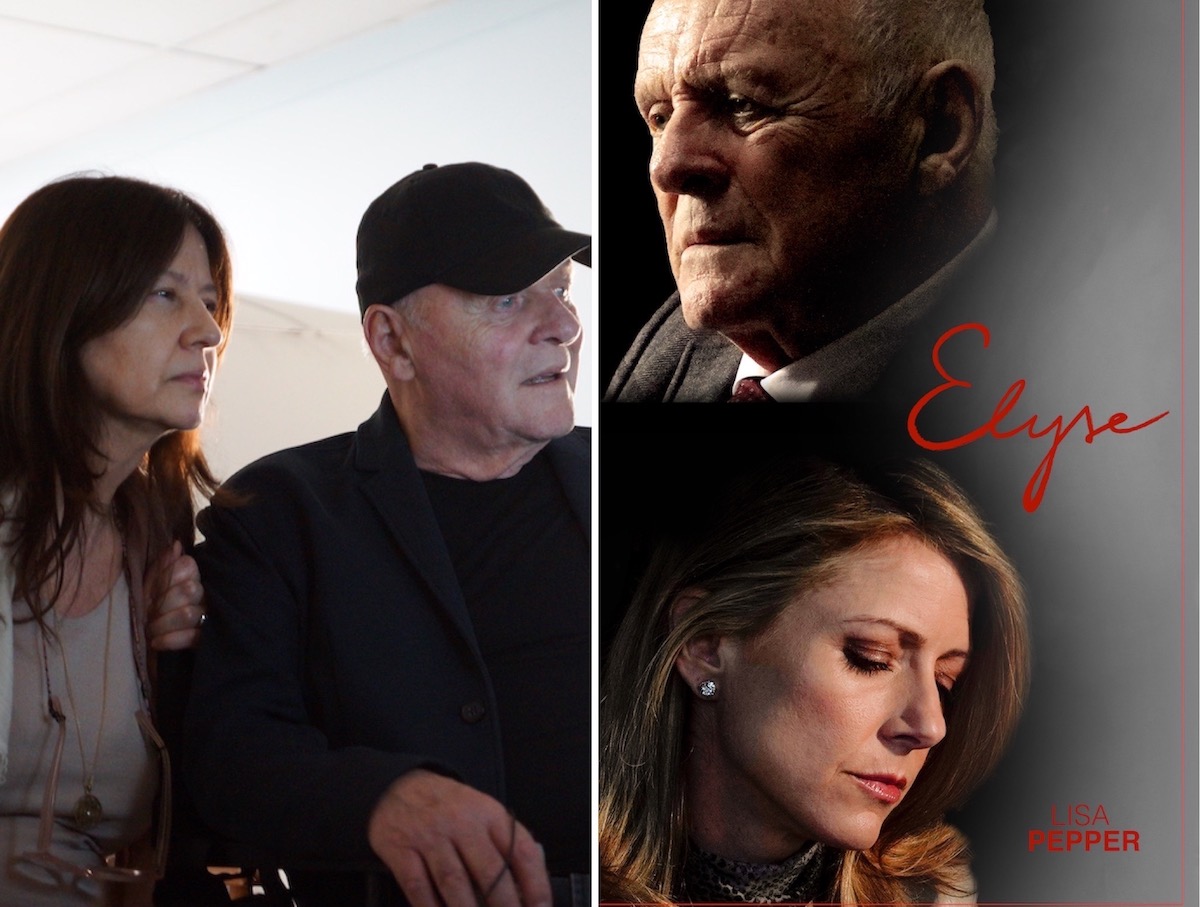Latina filmmaker, Stella Hopkins, from Colombia, embarked on the creative experience of a lifetime when helming her directorial debut, “Elyse,” a new psychological thriller co-starring her husband, Oscar-winner Sir Anthony Hopkins. Lisa Pepper stars in the titular role of a troubled woman whose memories and hallucinations become indiscernible from one another, as her life gradually unravels. Anthony plays the doctor who attempts to help Elyse come to terms with the trauma buried in her past, while making the first steps toward building a new life.
Stella was determined to depict the challenging subject matter with nuance, portraying the full complexities of mental illness, from the candidly painful realities to the moments of hope and healing. The film premiered this past Friday on iTunes, VOD, streaming (Amazon Prime, Google Play, YouTube), and in select theaters. In the following conversation, Stella speaks with me about the personal nature of this project, its intriguing visual style and collaborating with her husband just over a decade after his own directorial debut, “Slipstream.”
Congratulations Stella, I know you are a creative artist, but I didn’t know you had ambitions as a filmmaker. Why did you decide to become a director at this point?
At the age of 20, I opted to abandon my studies at John Jay of Criminal Justice in New York to move to Los Angeles in pursuit of my passion for film. I wanted to be an actress – I got a few bit parts and one-liners – and I quickly realized the challenges of the industry. My basic survival needs prompted me to get a full-time job. Tichi Wilskerson Miles gave me an opportunity to join The Hollywood Reporter, one of my life’s treasured memories. My passion for film never died.
Sometimes women have a hard time stepping into our power, so I have to ask you when was your “Aha” moment that made you acknowledge, “Yes, I’m a director!”
It came when I went on a tech scout with Dante Spinotti and our crew, and he looked around and asked me a question, and he did it with such respect, and I realized: “I am the director, and my opinion counts, even for someone as experienced and talented as Spinotti!” It was a true collaboration and it helped me with my confidence as a director.
<span id=”selection-marker-1″ class=”redactor-selection-marker”></span>
What draws you to exploring the blurred line between reality and fantasy in a way that is cinematic?
For me, life has the illusionary quality of a dream. I often question the nature of reality, so it was inevitable for me to incorporate this premise in the creation of “Elyse.”
You worked with a casting director, but what was important for you in making casting decisions?
It was important to me to give opportunities to people who may not have been well-known. So I also worked with a circle of family and friends who knew of talented people they could recommend and I think we ended up with a great cast. They were trained actors, but some were unknown, and they rounded out the performances perfectly. Such as Anthony Apel who played the nurse, David with such empathy and compassion.
How did you go about casting Lisa Pepper, whom you acted alongside in 2007’s “Slipstream,” in the titular role, and how did she embody the character you had envisioned?
Lisa Pepper is a professional actor whom I respect. After “Slipstream,” she stepped away from her career to be a mother. Lisa is afflicted with Complex regional pain syndrome, which triggers random paralyzing pain. She used this reservoir of emotions in developing the character.
How did this film spawn from your own relationship with your family?
My mother was an undiagnosed schizophrenic. I understand on a deep level the devastation family and friends endure when a loved one is afflicted with mental illness.
The lead character in this film suffers a catastrophic incident which triggers extreme psychosis. In what ways do you feel mental illness has been portrayed inaccurately on screen, and in what ways did you want to subvert those tropes with this film?
This is a difficult question to answer. I will limit myself to say that I went above and beyond to safeguard the film against making gross, negligent mistakes in depicting mental illness.

What was your research process like in terms of portraying Elyse’s psychological state with accuracy?
I engaged the professional services of Dr. Sheski, Professor of Psychiatry at USC. I wanted to be certain to accurately portray Elyse’s condition of Borderline Personality Disorder and chronic depression.
What was the significance of the Wizard of Oz book throughout the film?
The Wizard of Oz is a book that many mothers have read to their children, but I chose it particularly because of the lines: “If we walk far enough we will find a place.” We walk, and walk and sometimes we come back to where we started. But life continues, and this film is about the journey of life and walking our own yellow brick road.
Not everyone knows that your husband, Sir Anthony Hopkins, is also a composer. What was the process like of working with him in his role as a composer?
Working with Tony on the score was one of the most rewarding experiences in creating the film. His score helped to set the pace of the film, and he masterly interpreted the lullaby I heard in my mind for Elyse. He composed a Lullaby for Elyse that served as her place of solace and comfort. When someone is experiencing mental illness you see their loneliness, isolation, sometimes volatile violent behavior that tends to alienate their loved ones, and they need a place to escape. Elyse is humming a tune that is a bit melancholy, but also has a tinge of light and solace. I felt she possessed this inner sound to soothe through the darkness of her life.
And did you experience any of this with your mother, who you said also experienced mental illness?
Yes, I was about 8 or 9 years old when I knew something was wrong. As an undiagnosed schizophrenic my mother could sometimes be inadvertently cruel or negligent. She was also a beautiful singer and a trained opera singer, so music was an escape for her, the place where she could find comfort. I called on those memories of my mother in formulating the tune for my Elyse character.
There is one scene that stunned me. When Elyse looks at the picture her son Cody drew for his father’s birthday, it shows Cody and his father inside a heart, but the mother outside of the heart.
Yes, the painful reality when you have a mentally ill parent is that the child knows instinctively that something is wrong, and shrinks away from that parent. And Cody had been hurt just enough that he didn’t want his mother in his heart, or to be in her heart.

You’ve cited John Cassavetes’ “A Woman Under the Influence” and Ingmar Bergman’s “Persona” as creative influences on the project. How so?
Cassavetes created extraordinary nuances for Mabel’s character. He beautifully orchestrated the contrast of Rowlands’ sensuality and body contortions in portraying her mental illness. Having lived in Sweden for seven years, I was strongly influenced by Scandinavian filmmakers and my partner at the time, Director Gunnar Hellstrom.
Bergman’s “Persona” presents the duality of insanity and sanity, and Andersson’s and Ullmann’s performances conveyed both. Ullmann’s performance mostly without dialogue was flawless.
What inspired you to lens the first half of the film in black and white, which effectively incorporates the color red in the opening title sequence?
I used black and white at the opening of the film to depict Elyse’s blurry recollection of her life prior to being institutionalized. The black and white was a cinematic choice that served to capture Elyse’s memories intertwined with hallucination. The choice of red is symbolic of the feminine beauty Elyse once possessed and the unfortunate horror of death.
What do you want people to realize after watching your film?
One, I want them to know that mental illness does not have to be a subject we shy away from. It can be used in a way that can be creative. It doesn’t have to be a taboo, or something we have to be ashamed of. I want the film to help develop empathy for those going through the trauma of mental illness.
And two, Hollywood is a difficult place for women, and particularly for women of color. I am so grateful as a female Latina to have this opportunity to make this film, and I want other Latina women and minority females to have this platform. I hope this film inspires them to find their voice.
“Elyse” is now available on iTunes, VOD, streaming (Amazon Prime, Google Play, YouTube), and in select theaters.
Header image caption: Stella Hopkins and Anthony Hopkins on the set of “Elyse.” Courtesy of Gravitas Ventures.












